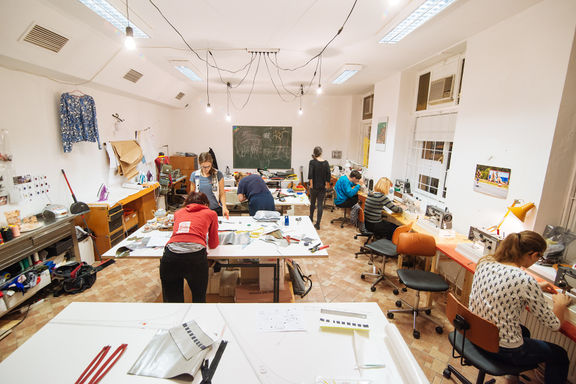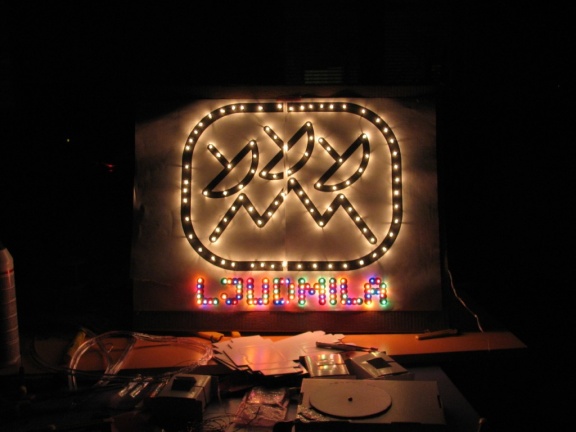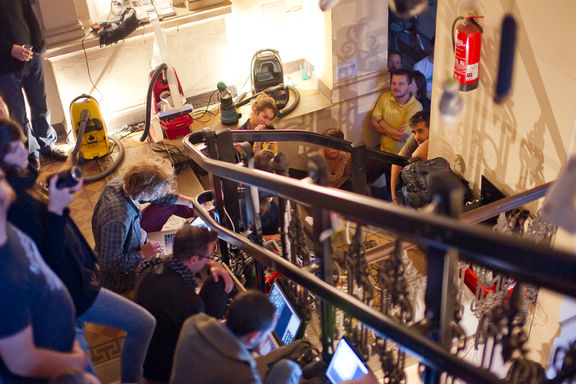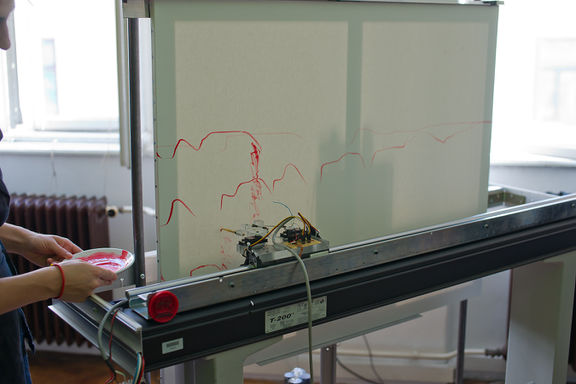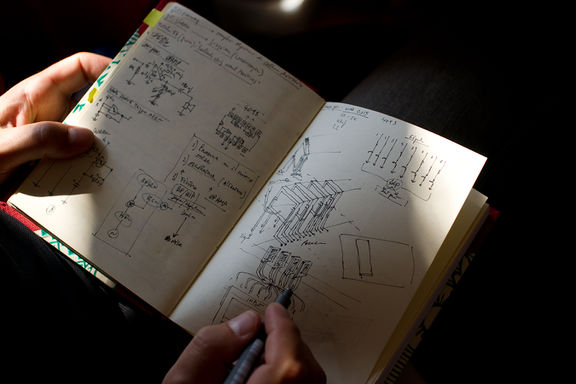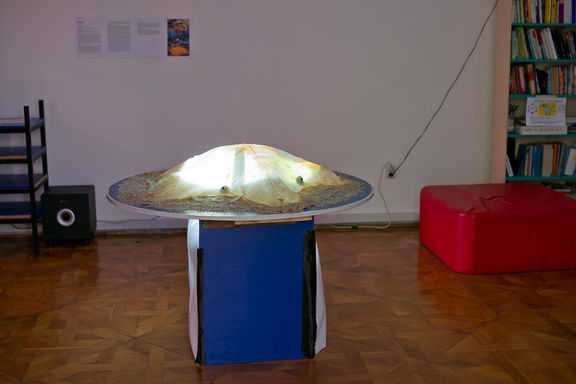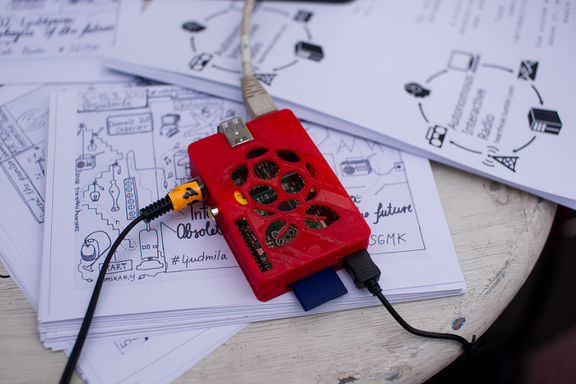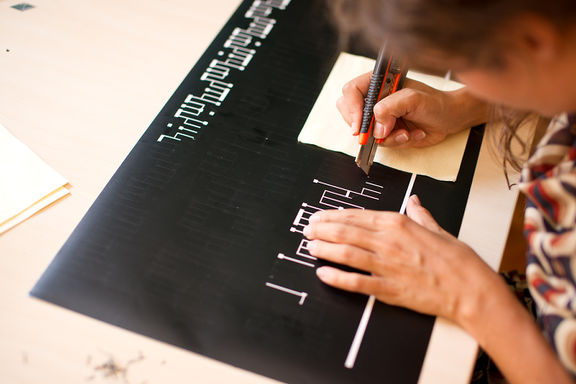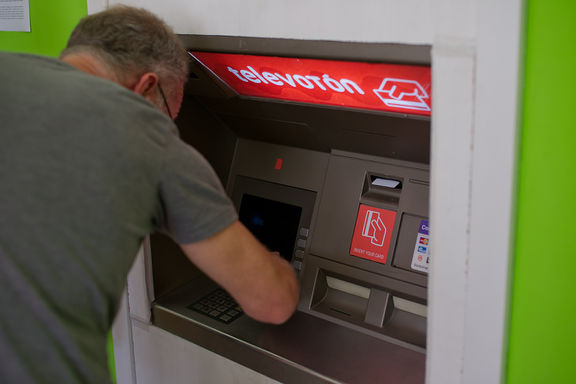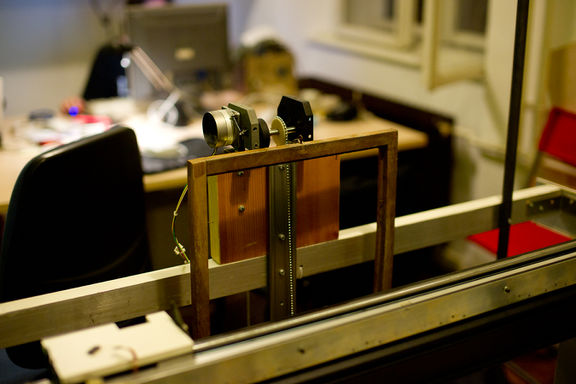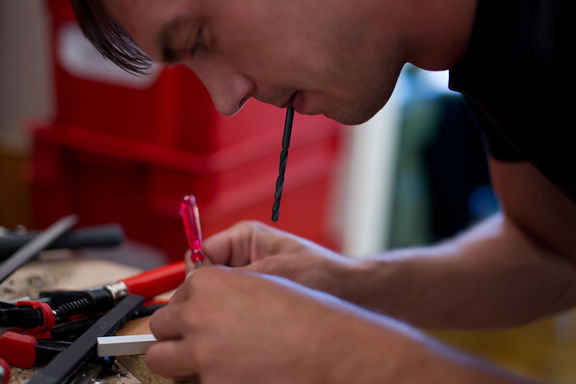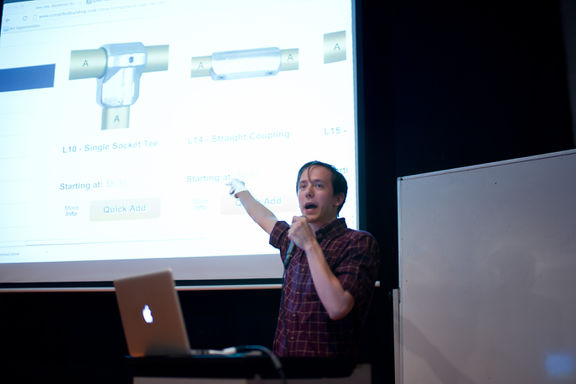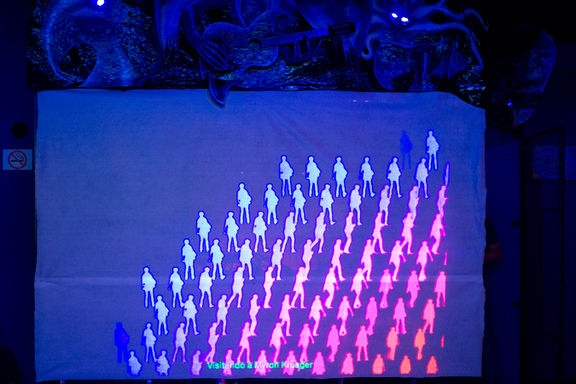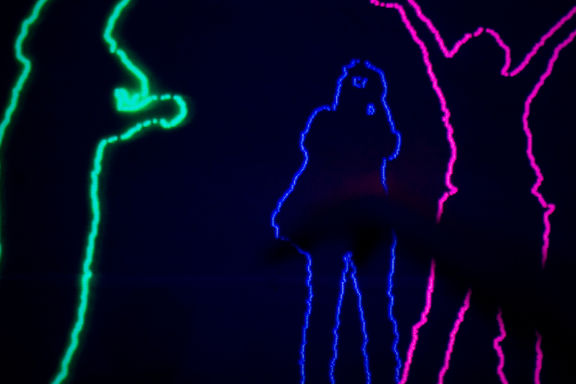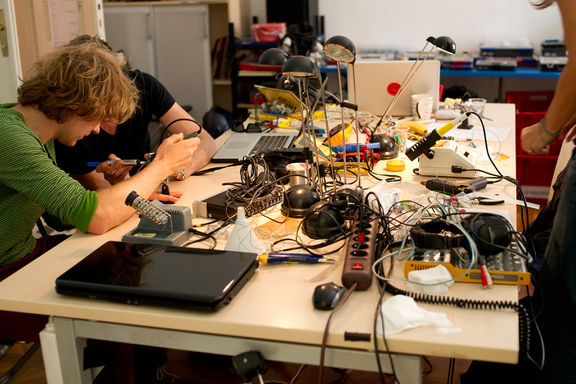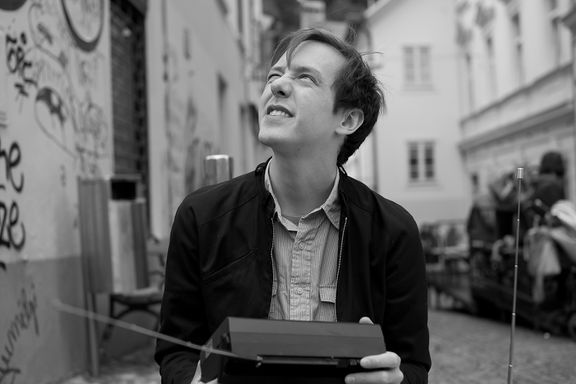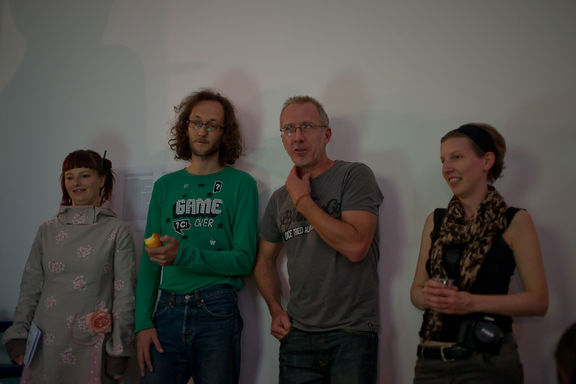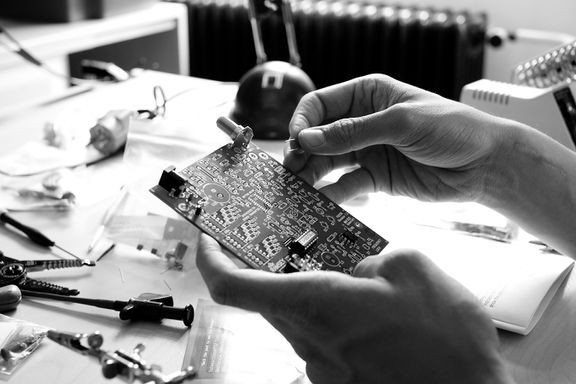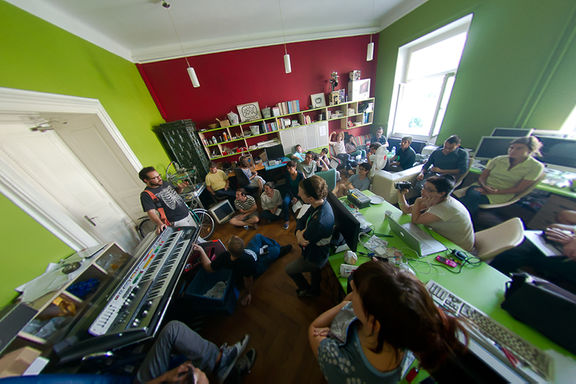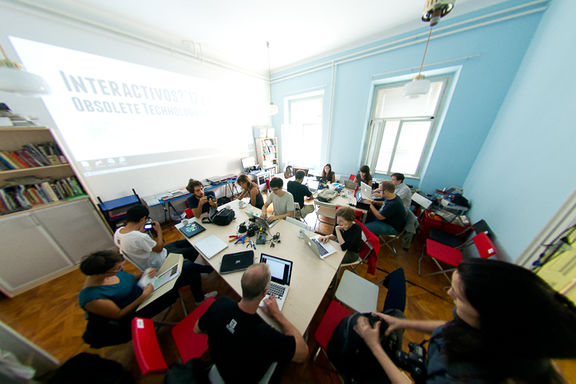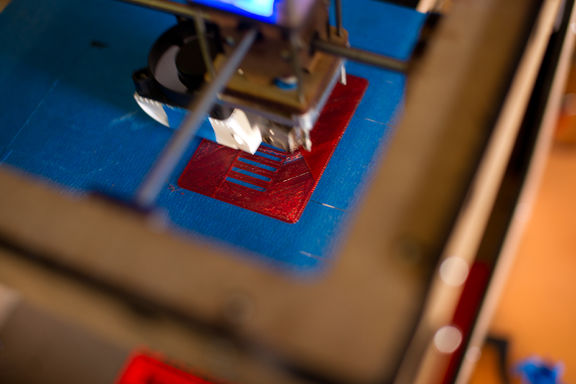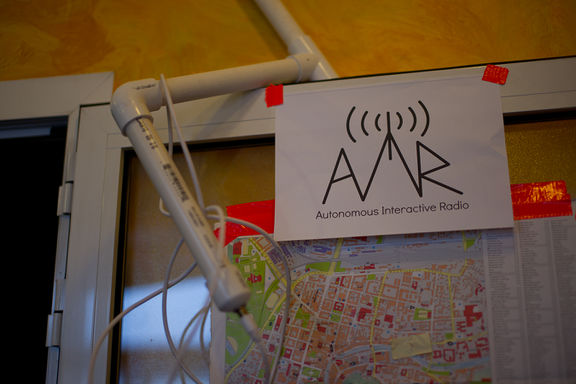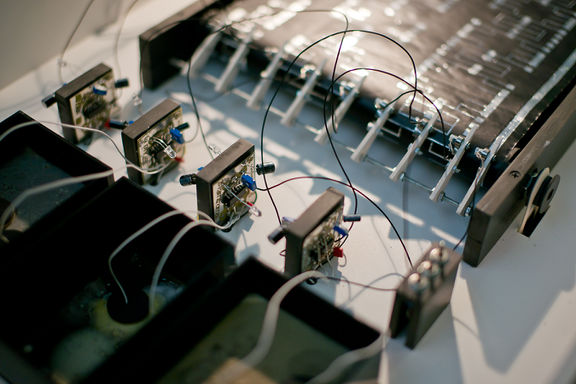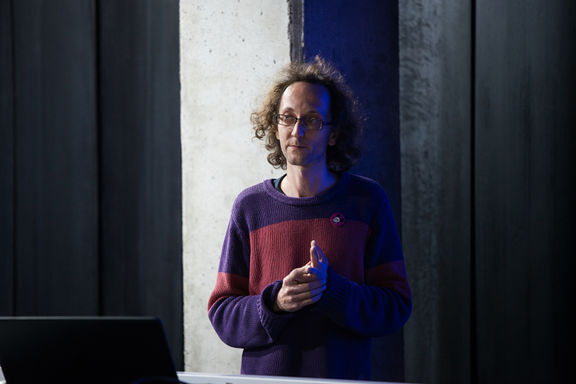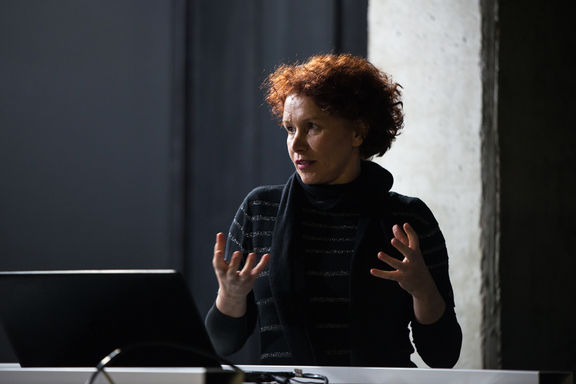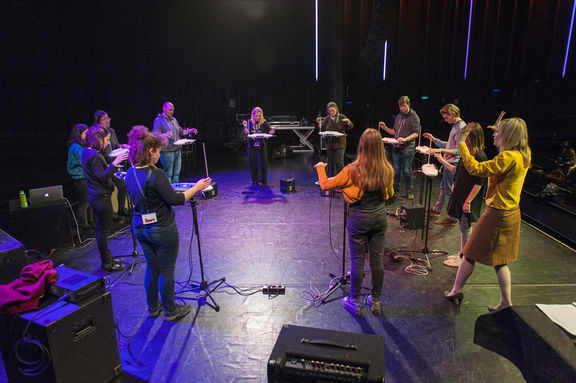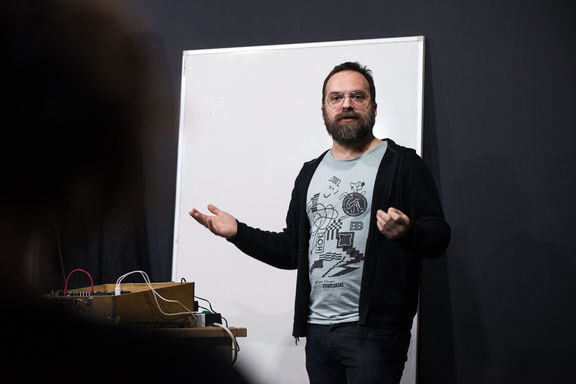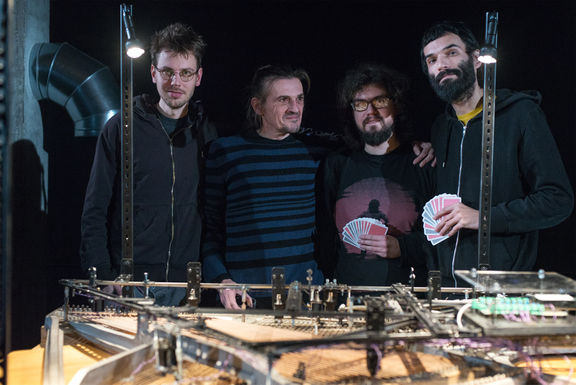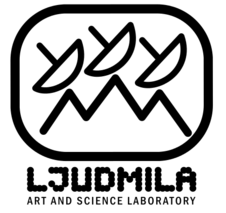
-
23 Apr 2023
NetherlandsUtrechtNicolaaskerkHybrid Acoustics concert including patterns in modulation by Blaž Pavlica produced by Ljudmila Art and Science Laboratory at the International Conference on Live Coding (ICLC).
-
to
19 Apr 2023
23 Apr 2023
NetherlandsUtrechtInstitute of Sonology, Tivoli, VogelfreiLjudmila Art and Science Laboratory at the International Conference on Live Coding (ICLC).
-
14 Dec 2019
GermanyKarlsruheZKM Zentrum für Kunst und MedienSonic Experiments»On the Internet, no one can hear you're a dog, a lecture by Luka Frelih (Ljudmila Art and Science Laboratory) and a live performance by Container Doxa
-
to
9 Nov 2019
10 Nov 2019
SwedenStockholmRoyal College of MusicFestival for Art, Science & TechnologyTadej Droljc's presentation Composing with isomorphic audiovisual gestalts and a performance of his work Capillaries Capillaries, organised by Ljudmila Art and Science Laboratory in the framework of the EASTN-DC project.
-
to
16 Oct 2019
19 Oct 2019
FranceGrenobleAgora CreativeAn installation Loops in transmission and SODA, A semi-modular instrument building DIY workshop by Staš Vrenko, produced by Ljudmila Art and Science Laboratory
-
to
13 May 2019
16 May 2019
DenmarkCopenhagenAalborg University CopenhagenQueens FestivalLiminoid installation by Saša Spačal and Matic Potočnik produced by Ljudmila Art and Science Laboratory, a member of the European Art - Science - Technology Network (EASTN) for Digital Creativity,
-
to
23 Mar 2019
5 May 2019
GermanyRostockRostock Art GalleryThe interactive sound installation Time Displacement: Chemobrionic Garden by Robertina Šebjanič, Aleš Hieng – Zeron and Ida Hiršenfelder (Projekt Atol Institute, Ljudmila Art and Science Laboratory)
-
30 Jun 2018
United KingdomManchesterMartin Harris CentreA semi-modular instrument building workshop Soda by Staš Vrenko and a lecture by Luka Frelih (Ljudmila Art and Science Laboratory, Creative Commons Slovenia) in the frame of the European Art-Science-Technology Network Week
-
to
5 May 2018
29 Jun 2018
AustriaGraz/GradecEsc medien kunst laborDark Drops by Robertina Šebjanič and Time Displacement / Chemobrionic Garden by Robertina Šebjanič, Aleš Hieng - Zergon, and Ida Hiršenfelder (Projekt Atol Institute, Ljudmila Art and Science Laboratory),
-
to
28 Apr 2017
30 Apr 2017
CanadaTorontoLuka Frelih (Ljudmila Art and Science Laboratory, Creative Commons Slovenia) and Dare Pejič (Creative Commons Slovenia) at the Creative Commons Global Summit
-
to
20 Mar 2017
22 Mar 2017
CroatiaZagrebMočvara GalleryThe interactive sound installation Time Displacement: Chemobrionic Garden and artist talk by Robertina Šebjanič, Aleš Hieng – Zeron and Ida Hiršenfelder (Ljudmila Art and Science Laboratory)
-
to
1 Feb 2017
5 Feb 2017
GermanyBerlinSpektrum, Werkstatt BerlinAn audio-video performance and workshops by the Theremidi Orchestra, produced by Ljudmila Art and Science Laboratory and Projekt Atol Institute in cooperation with Werkstatt ThoughtWorks Berlin and SPEKTRUM and organised in cooperation with the Slovenian Cultural Centre in Berlin and the Embassy of the Republic of Slovenia in Berlin,
-
to
30 Sep 2016
2 Oct 2016
PortugalLisbonEscola das Gaivotas, Rua das Gaivotas 6Luka Frelih (Ljudmila Art and Science Laboratory, Creative Commons Slovenia), Dare Pejič (Creative Commons Slovenia) and Saša Kranjc (Creative Commons Slovenia, IPI Institute) at the Creative Commons Europe Meeting
-
to
8 Sep 2016
18 Sep 2016
AustriaLinzOK im OÖ KulturquartierAurelia 1+Hz / proto viva generator by Robertina Šebjanič and Slavko Glamičanin at the CyberArts exhibition, Time Displacement / Chemobrionic Garden by Robertina Šebjanič, Aleš Hieng and Ida Hiršenfelder (Projekt Atol Institute, Ljudmila Art and Science Laboratory), Miserable Machines: Soot-o-mat by Špela Petrič, and Anatomy of Frozen Genesis by Dean Verzel
-
to
23 Aug 2016
28 Aug 2016
PolandToruńTheatre "Baj Pomorski"Light Oscilator by Tilen Sepič (Strip Core/Forum Ljubljana) at the Bella Skyway Festival, co-organised the Ljudmila Art and Science Laboratory and Projekt Atol Institute,
-
to
21 Dec 2015
23 Dec 2015
CyprusNicosiaARTos FoundationX-Dream FestivalNoise Script, a workshop in DIY electronics with visual scores for experimental sound art, and live performances by the Theremidi Orchestra (Ljudmila Art and Science Laboratory)
-
to
16 Oct 2015
17 Oct 2015
SwedenGothenburgÅvägen 24, BrewhouseLuka Frelih (Ljudmila Art and Science Laboratory) among the speakers at the Beyond the Obvious Annual Conference by Culture Action Europe
-
to
24 Sep 2015
4 Oct 2015
CroatiaZagrebGradec, Klovićevi Dvori GalleryAurelia 1+Hz / proto viva generator by Robertina Šebjanič, Liminoid by Saša Spačal and Matic Potočnik (Ljudmila Art and Science Laboratory), and Self-Portrait by Boštjan Čadež at the festival Device_art 5.015, with curator Sandra Sajovic (Kapelica Gallery), organised in collaboration with Kapelica Gallery,
-
to
11 Sep 2015
13 Sep 2015
PortugalCascaisGaleria da Marina, Jardim da Igreja Paroquial, Pavilhão MultiusosProjects In parallel by Natalija Črncec and Nina Šulin, Soundlighter by Izland (Gašper Milkovič Biloslav and Marko Vivoda) and jesusonecstasy aka Mitja Cerkvenik (Ljudmila Art and Science Laboratory and Projekt Atol Institute), and the workshop Clouds by Tilen Sepič (Strip Core / Forum Ljubljana) at the festival Lumina
-
5 Sep 2015
AustriaLinzArs Electronica Center, SkyLoftArs Electronica Festival LinzA presentation by Luka Frelih (Ljudmila Art and Science Laboratory) at the Smart Creativity, Smart Democracy: 2nd Council of Europe Platform Exchange on Culture and Digitisation,
-
28 Oct 2014
IsraelHolonIsraeli Center for Digital ArtAn artist talk by artist-in-residence Tanja Lažetić and a presentation of the portal Culture.si by Helena Pivec (Ljudmila Art and Science Laboratory), supported by the Embassy of the Republic of Slovenia in Tel Aviv,
-
8 Dec 2012
Czech RepublicPragueNew Stage of the National TheatreŠpela Petrič and Robertina Šebjanič (Kapelica Gallery and Ljudmila) presenting their project Towards the (in)Human Spore at the MutaMorphosis Conference
- Shaping The Future, 2021
Project summary - On-the-Fly: Fostering Live Coding practices across Europe, 2020
Project summary - EASTN-DC: European Art-Science-Technology Network for Digital Creativity, 2017
Project summary - Changing Weathers, 2014
Project summary Show more
As of 2017, Ljudmila shares the 8th floor of a skyscraper in the centre of Ljubljana with two other NGOs, the Delak Institute and the Projekt Atol Institute. Together, they work on running it as a multifunctional venue for new media art and contemporary theatre. It is called Osmo/za.
Ljudmila's programmes are rather diverse and wide-reaching. It runs the art&hacking meeting PIFcamp and organises workshops on the uses of open source software and on making DIY technological hacks; supports the production of new media artworks; and more. Since 2010, it operates the Culture.si portal and, as of 2013, also the metasearch engine and culture aggregator Kulturnik.si. For a time, starting in 2011, it acted as a public lead of Creative Commons Slovenia.
Mission
Ljudmila engages in the development and popularisation of open culture, free licences and software, and in new ways of data distribution. It detects the ways through which the transformations in the field of information and communications technologies affect the society and encourages the corresponding cultural and artistic practices.
Background
The laboratory is a successor to the Ljudmila - Ljubljana Digital Media Lab, as of 1994, a programme of the Open Society Institute Slovenia and, later, also the KUD France Prešeren Arts and Culture Association. Self-proclaimed as "the latest spin-off" from the Open Society Institute – Slovenia (1992–2000), the Ljudmila Art and Science Laboratory was established by 10 new & all media artists, software developers, hackers and computer engineers in 2010.
The founding members of the Ljudmila Art and Science Laboratory are Urban Belina, Mitja Doma, Luka Frelih, Tomaž Ižanc, Žiga Kranjec, Igor Križanovskij, Zoran Obradović, Alenka Pirman, Robertina Šebjanič and Živa Zupan.
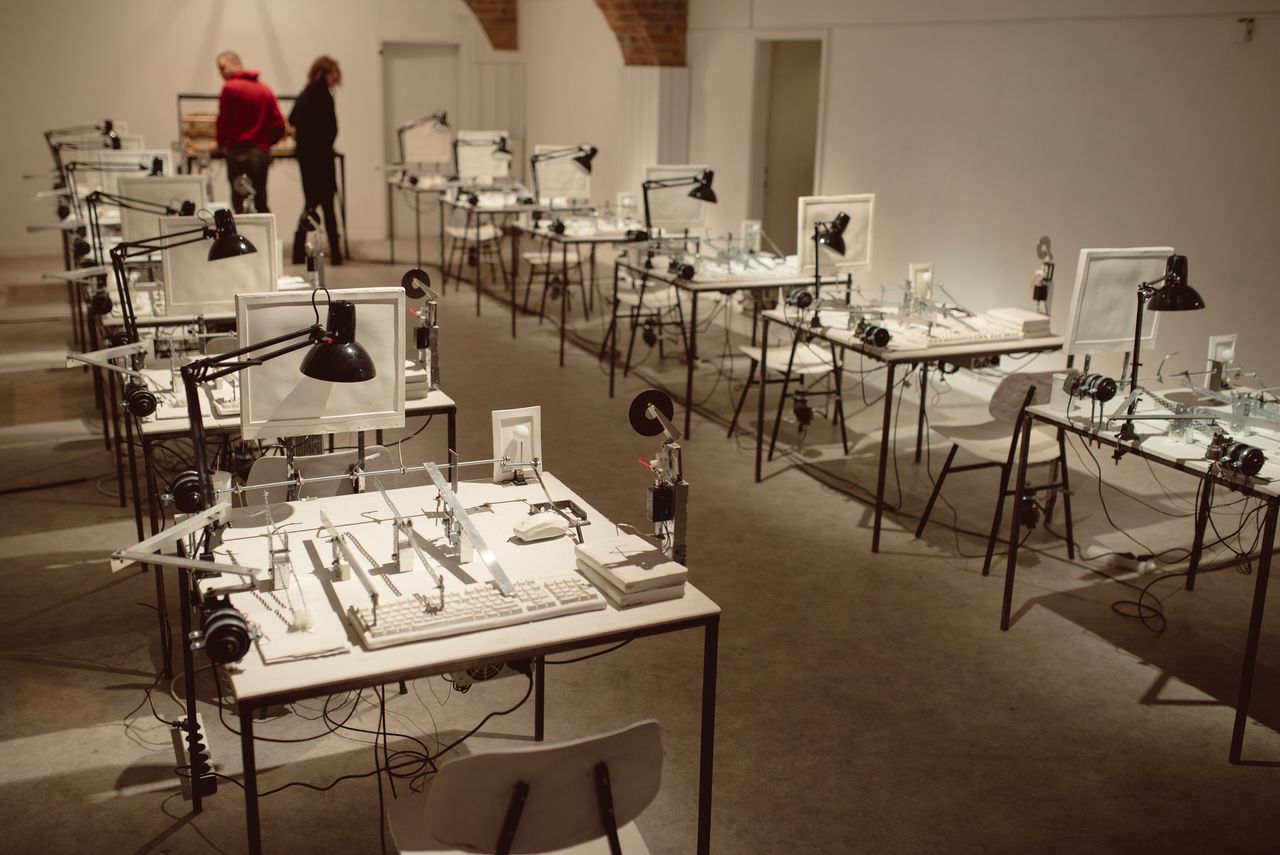 Nevromat [Neur-O-Matic] by Lenka Đorojević & Matej Stupica, produced by Ljudmila Art and Science Laboratory and Projekt Atol Institute, 2014
Nevromat [Neur-O-Matic] by Lenka Đorojević & Matej Stupica, produced by Ljudmila Art and Science Laboratory and Projekt Atol Institute, 2014
Educational programmes
Ljudmila organises regular courses in basic and advanced use of open source software (Blender, Pure Data, MediaWiki), as well as the Free Circuit (Prosto-vezje) workshops and Digital Dish public lectures and artist talks by international new media artists.
The workshops usually feature various modes of "tinkering" with electronic circuits and technology in general, hacking and re-imagining it with the help of free software ("home-made synths" and "wearable electronics" serving as a typical example). The participants are encouraged to search for further uses and include the findings in their artistic work. Since 2013, Ljudmila has been developing its education programmes together with the Projekt Atol Institute.
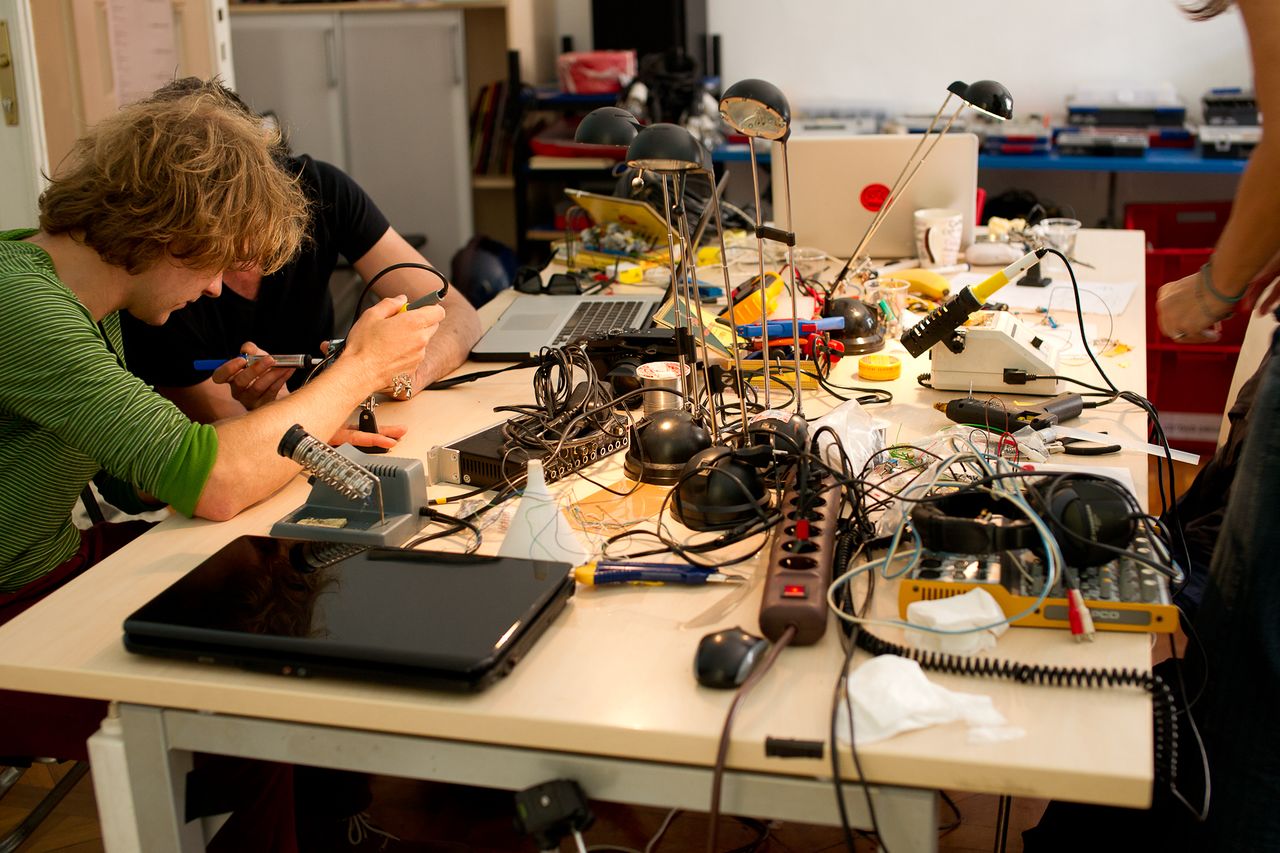 Interactivos?’12 Ljubljana: Obsolete Technologies of the Future at Ljudmila - Ljubljana Digital Media Lab, 2012
Interactivos?’12 Ljubljana: Obsolete Technologies of the Future at Ljudmila - Ljubljana Digital Media Lab, 2012
Art projects and residencies
Ljudmila's artistic endeavours, also often involving Projekt Atol, usually fall under new media art. It focuses on young artists, offering them technological and other support for their productions. Some of the artworks produced by Ljudmila are Neur-o-Matic, an awarded analogue media-art installation by Lenka Đorojević & Matej Stupica; and the interactive generative sound installation Time Displacement | Chemobrionic Garden, created by Robertina Šebjanič, Aleš Hieng and Ida Hiršenfelder, which was nominated for the STARTS Prize – the Grand Prize of the European Commission honouring Innovation in Technology, Industry and Society Stimulated by the Arts.
The laboratory also organises artist residencies, inviting and hosting one artist from abroad per year. Participating residents have included Hannah Perner-Wilson, Peter Edwards, Servando Barrerio, Bengt Sjölén, James Powderly & Eun-Jung Son and Chris Sugrue.
PIFcamp and festivals
PIFcamp, a temporary hacker-base set in the idyllic valley of Trenta, Slovenia, was first set up in 2015. Hands-on workshops, presentations, field trips, artistic explorations and random gadget tinkerings take place in an atmospehere of collective research and creation. Participants are assisted by experienced local and international guests from different fields.
It regularly collaborates with Lighting Guerrilla Festival with its Lighting Guerrilla Laboratory programme. In 2020 it organised a week long international festival of new media art called A dela? [Is It Working?].
Portals and digital agenda
On the behalf of the Ministry of Culture, Ljudmila ran two web portals in the period 2009–2020: Culture.si, which offers information on Slovene cultural producers, venues, festivals and support services, all in one place; and Kulturnik.si, a digital aggregator and search engine for all things (Slovene) culture.
In 2013, Ljudmila Art and Science Laboratory was invited by the Ministry of Culture to collaborate with the National and University Library and Archives of the Republic of Slovenia and organise a line of discussions related to the Digital Agenda in the Field of Culture in order to identify the issues and outline basic standards and recommendations for a common strategy. The working group led by Ljudmila focused on data acessibility, while the other two groups discussed the processes of digitisation and permanent data preservation.
Ljudmila has also been collaborating with the Slovene Museum Society, organising discussions on museums and the web. It advises art institutions on web design, manages the servers infrastructure for various NGOs, and is generally interested in the developments of digital politics and policy.
Other past activities
In 2013 Ljudmila launched the Strictly Analog Festival, then an international joint project with partner institutions from Graz, Trieste and Tokyo as well as with the locally based Lighting Guerrilla Festival, MoTA Museum of Transitory Art and Projekt Atol Institute.
As a result of a theremin and theremidi physical interface workshop at Ljudmila in 2011, the electronic noise ensemble Theremidi Orchestra was founded in 2011, in collaboration with Borut Savski from Cirkulacija 2. The Theremidi audiovisual public presentations at festivals are usually combined with open workshops on making DIY instruments and gadgets.
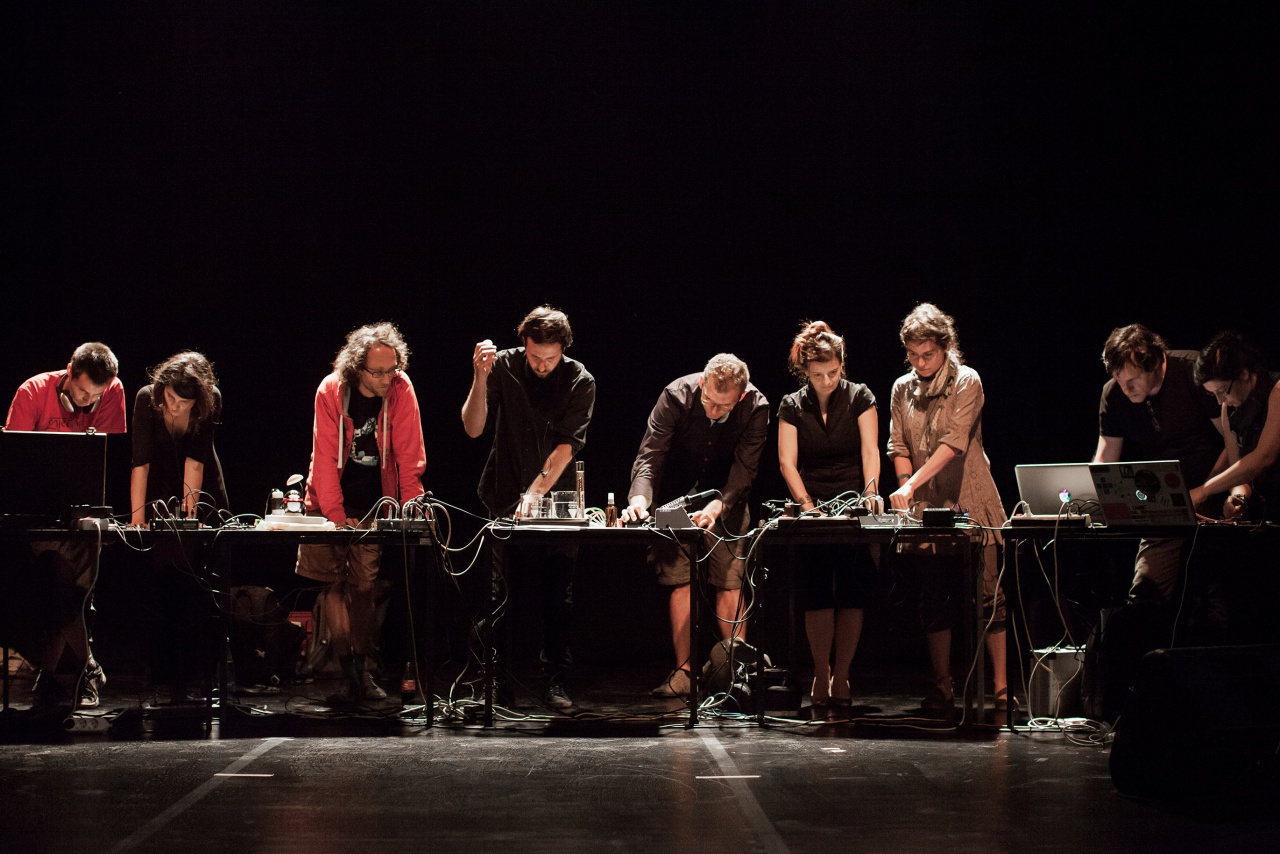 Theremidi Orchestra, group of enthusiasts from Ljudmila Art and Science Laboratory performing at Mladi levi Festival and 7th edition of U3 Triennial of Contemporary Slovene Arts, 2013
Theremidi Orchestra, group of enthusiasts from Ljudmila Art and Science Laboratory performing at Mladi levi Festival and 7th edition of U3 Triennial of Contemporary Slovene Arts, 2013
See also
- Osmo/za
- PIFcamp
- Culture.si
- Kulturnik.si
- Projekt Atol Institute
- Creative Commons Slovenia
- Ljudmila - Ljubljana Digital Media Lab (further history of the laboratory)
External links
- Ljudmila Lab website
- Powered by Ljudmila - exhibition at City Art Gallery Ljubljana in June 2011
- Documents of the programme Digital Agenda in the Field of Culture, 2013 (in Slovenian)
- The final document Digitalisation Guidelines – Cultural Heritage Long-term Preservation and Access (in Slovenian)
Gallery
- KONS Platform
- Producers
- Publishers
- Event organisers
- New media art
- New media art studios
- New media art producers
- EU funding of Slovene organisations (Culture and MEDIA Programmes)
- EU Creative Europe, Culture funding recipient
- New media art festival and event organisers
- New media art course and workshop organisers



![Od oblike do oblike [Form from Form] in Match Gallery by Dan Adlešič, Tilen Sepič and Matic Potočnik, Lighting Guerrilla Festival in co-production with Ljudmila Art and Science Laboratory, 2013](/images/thumb/c/c5/Lighting_Guerrilla_Festival_2013_Form_from_Form.JPG/576px-Lighting_Guerrilla_Festival_2013_Form_from_Form.JPG)
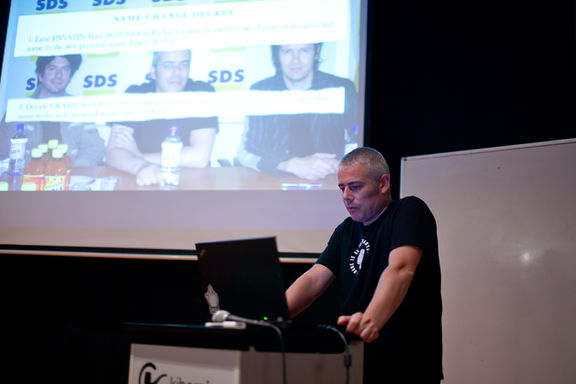
![Nevromat [Neur-O-Matic], Lenka Đorojević & Matej Stupica, produced by Ljudmila Art and Science Laboratory and Projekt Atol Institute, 2014. An OHO Group Award winner.](/images/thumb/9/99/Ljudmila_Art_and_Science_Laboratory_2014_Dorojevic_Stupica_Neur-O-Matic_Photo_Miha_Peterlic_%283%29.jpg/576px-Ljudmila_Art_and_Science_Laboratory_2014_Dorojevic_Stupica_Neur-O-Matic_Photo_Miha_Peterlic_%283%29.jpg)
![Nevromat [Neur-O-Matic], an installation by Lenka Đorojević & Matej Stupica that got the OHO Group Award in 2015](/images/thumb/b/b7/Ljudmila_Art_and_Science_Laboratory_2014_Dorojevic_Stupica_Neur-O-Matic_Photo_Miha_Peterlic_%282%29.jpg/576px-Ljudmila_Art_and_Science_Laboratory_2014_Dorojevic_Stupica_Neur-O-Matic_Photo_Miha_Peterlic_%282%29.jpg)
![Nevromat [Neur-O-Matic] by Lenka Đorojević & Matej Stupica, produced by Ljudmila Art and Science Laboratory and Projekt Atol Institute, 2014](/images/thumb/0/06/Ljudmila_Art_and_Science_Laboratory_2014_Dorojevic_Stupica_Neur-O-Matic_Photo_Miha_Peterlic.jpg/576px-Ljudmila_Art_and_Science_Laboratory_2014_Dorojevic_Stupica_Neur-O-Matic_Photo_Miha_Peterlic.jpg)
